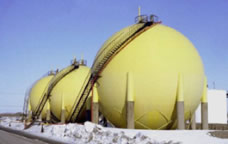|
Willie Sutton, a 1930s crook, was once asked, "Why do you rob banks?" His reported reply: "Because that's where the money is."
There is some doubt as to whether Sutton ever uttered that line, but there is less doubt about why companies today often do things that are not in society's best interest. In a lot of cases, the answer
 will be the same—money. For instance, a company may litigate to avoid cleaning up an environmental mess because it's cheaper to hire lawyers than clean-up crews. They may have allowed the mess to happen in the first place because implementing proper pollution controls would have reduced profits. In some cases, companies have even been known to coldly calculate that the profit from an illegal action will be far greater than the regulatory penalties, and proceed with the deed on that basis.
will be the same—money. For instance, a company may litigate to avoid cleaning up an environmental mess because it's cheaper to hire lawyers than clean-up crews. They may have allowed the mess to happen in the first place because implementing proper pollution controls would have reduced profits. In some cases, companies have even been known to coldly calculate that the profit from an illegal action will be far greater than the regulatory penalties, and proceed with the deed on that basis.
The economic disincentive to be green stretches across almost every industry and influences decisions not only on chemical waste, but also on:
- raw materials (how they are produced, stored, and processed);
- whether to use safer but more expensive reagents instead of cheaper but more toxic substances;
- worker welfare and community responsibility.
Economics can even affect issues as seemingly unrelated as animal welfare and water usage.
The profit motive is obvious enough when it comes to businesses. But why do politicians often fail to enact (or enforce) the laws needed to ensure environmentally and socially responsible behavior by companies? Campaign contributions from industry no doubt play a part. Without a fat "war chest," a politician risks losing his hold on power in the next election. When a company provides a large donation, politicians readily admit that the contribution buys "access" but strongly reject any suggestion that the contribution buys a favorable vote. However, fee-based political patronage has been going on since the days of the Roman republic, and it is clear that large contributions do indeed work to steer legislation and regulatory action in today's US government.
After the September 11, 2001 attacks in the US, there was a lot of buzz about the vulnerability of US chemical plants to terrorist attack, the fear being that an attack on a chemical plant would release large quantities of toxic chemicals that could devastate nearby communities. Indeed, the 1984 chemical-plant accident in Bhopal, India, which killed 15,000-30,000 local residents and permanently injured hundreds of thousands of others, showed the level of potential trouble for cities and towns near chemical plants. But in spite of the danger, the US chemical industry has used the political muscle it's gained through political contributions to thwart attempts by some in Congress to legislate tighter security and safety measures, claiming that the industry will take care of the problem on its own. But when company budgets for such efforts compete with quarterly profit statements, you can bet that some companies will fail to adequately meet the challenge.
Monetary motivations do not just affect corporations—they affects us consumers too. If an environmentally friendly product is more expensive than a standard, more toxic product, many consumers will opt for
 the cheaper, non-green alternative. Altruism, health, and environmental common sense often take a back seat to pocketbook sensitivities.
the cheaper, non-green alternative. Altruism, health, and environmental common sense often take a back seat to pocketbook sensitivities.
There is always some point at which the economic cost of producing an item in a more environmentally friendly manner becomes prohibitive. But on the other side of the question, if the item still causes health and environmental problems at its greenest, still-affordable design, should such an item be produced at all? Can a greener alternative, even if it does not satisfy 100% of our functional desires, still be the better choice overall? These are questions that will need to be examined more often in the future if we are to work our way back to solid planetary and personal health.
As a society, some may question whether we can really afford the cost of getting greener. Perhaps the real question is, can we afford not to?
In general, we are becoming more aware of the vast number of toxic chemicals being used in manufacturing and the many toxins found in everyday products. Nearly every person in the country now harbors traces of pesticides and other
 chemicals in their bodies. Children's developing bodies are particularly susceptible to the effects of chemicals. Communities are taking note of the environmental and aesthetic downside of factory farms and livestock operations. People are beginning to understand the concept of global warming and how reckless energy usage worsens that and other environmental problems. Little by little, the connections are becoming clearer.
chemicals in their bodies. Children's developing bodies are particularly susceptible to the effects of chemicals. Communities are taking note of the environmental and aesthetic downside of factory farms and livestock operations. People are beginning to understand the concept of global warming and how reckless energy usage worsens that and other environmental problems. Little by little, the connections are becoming clearer.
Saving a little bit by not buying earth-friendly products may net us a few extra bucks at the end of the month—and corporations are definitely saving billions of bucks by limiting their greenness—but the hidden, unaccounted-for costs to us all include poorer health, environmental degradation, and social inequity.
Though corporate robber-barons and their political comrades exert a lot of control on how things are run, ultimately, we the people hold the power of the vote (to get our politicians to behave) and the power of the dollar (to reward environmentally responsible companies).
Now, if only we had the power to keep all the neighborhood car alarms from going off every other day.
Resources:
- Environmental Voting Guide
- Environmental Products/Green Products
Get Grinning Planet free via email
|


